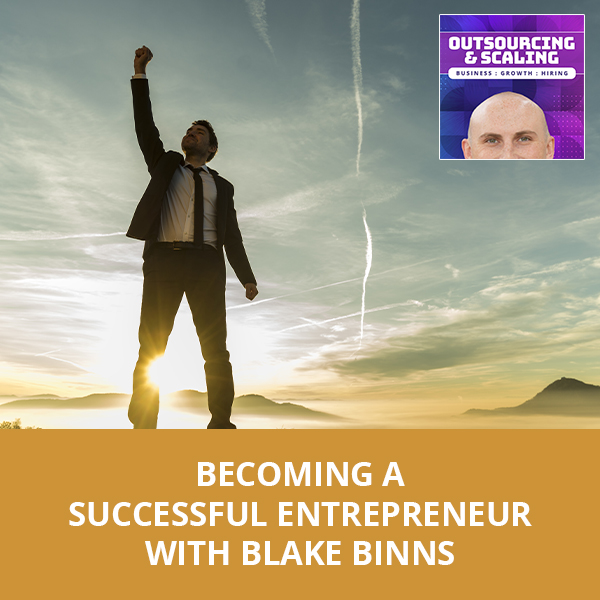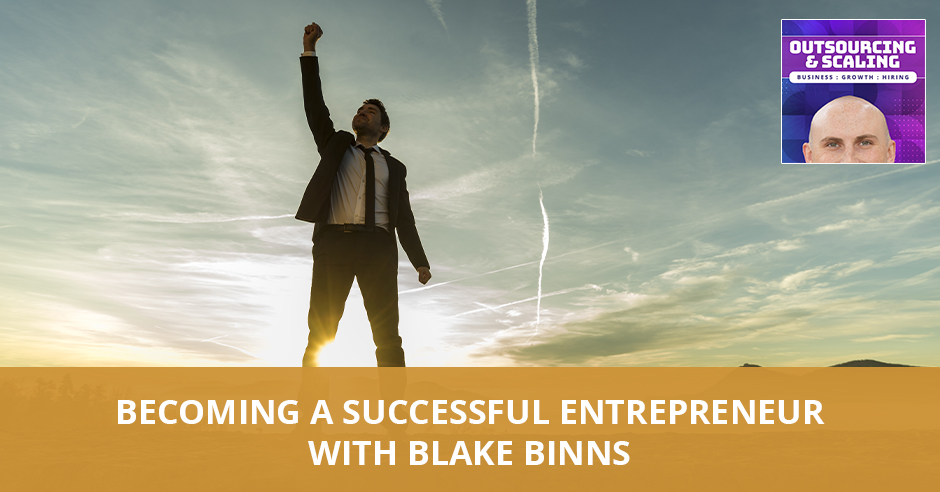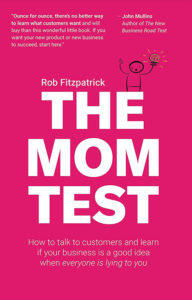


To be a successful entrepreneur you need a lot of perseverance, courage, risk-taking, and most especially, having people in your life who are going to tell you the truth. In this episode, Blake Binns, the Founder of Good Advice, a coaching company that helps businesses grow and scale, shares some advice on how to become a successful entrepreneur. He also talks about the common mistakes that most entrepreneurs make and offers tips to help you take your business to the next level and build your own empire.
—
Listen to the podcast here:
[smart_track_player url=”https://www.podetize.com/statsapi/www.podetize.com/wp-content/uploads/fileuploads/11-5b145ef137b51b3d1af0633e9305c43d/10/2019/e7917839ce081847045f910e0510f2ac.mp3″ title=”Becoming A Successful Entrepreneur With Blake Binns” artist=”Nathan Hirsch” image=”https://freeup.net/wp-content/uploads/2019/04/OAS.png” ]
Download the audio file here.
Becoming A Successful Entrepreneur With Blake Binns
My guest is Blake Binns. Blake, how are you doing?
I’m doing great.
For those of you that don’t know, Blake is the Founder of Good Advice, a coaching company that helps businesses grow and scale. He’s a former executive coach and he had the privilege of working with a multitude of nonprofits, small to medium businesses, and Fortune 500 companies. He has impacted thousands with his practical approach to business and has a gift for reducing complex issues to simple solutions. He’s an authentic speaker and coach. He continues to promote leadership, business concepts through this twice-weekly podcast called The Blake Binns Podcast, as well as his weekly newsletter. He currently resides in Arizona with his wife Joy and his amazing dog Sadie. We’re going to talk all about that, but first, let’s take a gigantic step back. What were you like as a kid growing up? Were you a straight-A student? Were you a rebel? Did you always know that you wanted to be an entrepreneur?
I’ve been a goofball my whole life. Since I was a kid, I love to have fun and make people laugh. I like to be a bright spot in someone’s day. What ended up happening in the entrepreneurship world is I also liked business. The disconnect was there were these people in business who were crotchety, formal, prim, and proper. I realized that working in a corporation wouldn’t be a good fit for me. I’d probably drive people crazy. Entrepreneurship seemed like the right answer.
What was your first real entrepreneurial endeavor?

I’ve done random side hustles. The weirdest one that I did is a funny example. I don’t know if you remember Pokémon Go. I live in a college town. Everybody was out, it was pretty wild. I remember driving around and seeing everybody go nuts for this stuff. It doesn’t reflect on me well, but I purchased a Pokémon Go domain for $8. It was selling Pokémon Go accounts. I made a lot of money quickly off it. I thought, “There are a lot of easy ways to make money if you pay attention to what’s happening.” I had some random sidelines before that but that was probably the first time that I had seen something and found a way to monetize it quickly.
Pokémon Go, the story I always remember with that is I was out with all my buddies in downtown Orlando. There’s Lake Eola, which from the bar you can see around the entire lake. Every single person, there must have been hundreds of people, had their phone out. They were walking around the lake. I’ve never seen anything like it.
It’s crazy. Speaking to entrepreneurship, there’s a worthy conversation on mindset. You’ll talk to people who say, “Entrepreneurs don’t make any money. There aren’t any opportunities for me.” There is a lot of opportunities. You have to be paying attention. You also have to be willing to be okay with rejection and failure. I tried an idea and it didn’t work out for me.
We talked about your first business. Let’s talk about your first hire. Who was that? How did that go?
I’ve never hired for one position. My first hires were always batch positions. I had to hire ten or fifteen people, for example. The first person I hired, she bombed her interview. I’m big on development and coaching people. I don’t know if I thought she would be a good pet project in the sense that I will make her successful. She was the epitome of dysfunction. She was always late, never made it to work, and hard to work with. I remember feeling extremely regretful thinking, “Why did I hire this person?” I thought I was doing her a favor. I thought I was cutting her a break. I was probably 21 or 22 at the time. It taught me a lot about hiring people, especially how they show you who they are in the actual interview.
You worked with and coached a lot of entrepreneurs. What are some of the biggest mistakes you see those entrepreneurs make?
There are two big issues. One is the ego. It’s, “My idea is amazing. It’s going to be incredible.” The most obnoxious thing that happens to me is when someone wants to meet to talk about their business, but they want me to sign an NDA from the get-go. I’m like, “You have no product and have no customers. You’re not doing anything; I’m not signing your NDA.” For them, it’s like, “This is my baby. I care about this.” The second thing is entrepreneurs sell things that nobody wants. There’s a great book that some of your readers can check out, it’s called The Mom Test. It’s all about this concept of you don’t go ask your mom what she thinks of your entrepreneurial product. Your mom loves you.
The skills that you’ve acquired as an entrepreneur that have made you successful are no different in the corporate space.
She’s going to be like, “Of course, the whole world’s going to buy that. Yes, you’re going to make the next Facebook.” She’s biased. The same thing’s true for your friends. Your friends want to see you succeed. They want to see you do well for yourself. These entrepreneurs throw this time and energy into a product that nobody wants. It’s not meaningful. It’s like this guy I talked to who was selling bedazzled leather wrist bands. He was like, “I’ve been working on it for a few months. I can’t get anyone to buy it.” Maybe there’s not a market for it? Maybe no one wants it? The people who have been telling you it’s a great idea want to see you succeed but they’re not your target customer. The biggest issue is you’re trying to sell something that people don’t want.
I got interviewed on a podcast where they asked me for my first business where I was selling baby products. They’re like, “Did you get validation from your friends, your family?” I was like, “Of course not. Everyone thought I was crazy.” I was in the opposite situation. My parents were supportive. They’re like, “You’re going to college. You’re not going to sell baby products.” Sure enough, I did that after college. I’m in CEO Space. I’m faculty there. There was this guy in CEO Space who was selling dresses. He had partnered with this other person who was making the dresses and was trying to sell it. He had lost his life savings selling these dresses, $500,000 over the course of a few years.
He had about $5,000 left on his bank account. This was the first time I heard about it. Other people in the room were being supportive. They’re like, “Stick to your idea.” I’m like, “You have $5,000 left, where are you going to sleep? How are you going to pay your bills when you’re done with that? You made some bad decisions. Let’s not keep making bad decisions.” The whole room was in shock that someone told that to him to his face. I’m like, “You guys all did him a huge disservice over the past couple of years, letting him go down this path when there’s clearly no market for this product.” Let’s talk about hiring. What is your mentality? What do you look for when you’re hiring someone?
I’m looking for someone who’s a good value fit. The way that I go about business, I have a particular philosophy that’s right for me. I’m looking for people who have a similar philosophy. One example of that is customer service is absolutely number one. It needs to be like the Chick-fil-A effect where people are viral about how I’ve treated them. If I bring someone on who doesn’t have that same passion, it’s not going to be a good fit.
A good example of this was we were doing this in-person program. It was at this retreat center on the lake. The company that had come to us, they had something shipped to them, but they had shipped it to our main office instead of to this corporate retreat center. They were going to leave and drive over to get this package that they wanted which was 45 minutes to an hour away. Me being the customer service-oriented person, it was like, “No, we’ll send our staff person. We’ll go get that. You stay here and keep enjoying yourself. “I had this contractor who was like, “We’re not doing that. They should have shipped it to the right place. That’s their fault.” Yes, it’s their mistake but we want to provide an experience to them where it’s like, “We’ve got you. We’ve got it taken care of.” That’s the most tangible example of where it’s not a good value fit.
For me, I’m hiring according to that. Also, I’m hiring for a specific role. The worst thing you can do is hire someone that’s a catch-all, “I’m drowning so let me bring on someone and hope that it works.” You want to hire someone for a specific purpose and function. That applies to frontline contractors, hourly contractors, and salary contractors. There has to be a need that’s getting filled. I try to keep that in my mind of, “What exactly is this person going to do when they come on to the company?”

If they’re virtual assistants, freelancers, if you’re a hiring agency, you need to know exactly what that role is going to be. It’s not, “I need more help, more work, and marketing.” It’s what specifically are they going to help with?
It’s also what causes you as a boss to feel like that company didn’t work for you. It wasn’t their fault; it was your fault. You bring on a VA to take over a lot of work, but you never specify what you want them to do. A few months later, you’re frustrated thinking that they’re a poor fit for you or they aren’t good when they’re phenomenal. You’re just a bad communicator and a bad delegator. That challenge sometimes is hard for business owners to swallow as they think about running their business.
I want to talk about problem-solving and breaking stuff down. This is something I’m going through with my VAs when there’s an issue. Let’s say a freelancer comes in and they have all these different confusions and problems. Before you do anything, you’ve got to break it down into different things and solve each one individually. That overall will solve the bigger problem, the same thing when Connor and I are meeting or trying to get through something. Walk us through your mindset, your mentality when it comes to problem-solving.
There’s a central problem and then everything else is noise. A great example of this is you’ll meet with an executive team or an ownership team. Their company’s bottom line is they’re not getting any customers. They don’t have enough revenue to sustain their operation. The problems in their mind are this radio spot, networking event, and fundraising event that they’re doing. It’s all these different symptoms of the problem which is people aren’t paying you for your product. The solution isn’t, “Let’s look at this fundraising event, plan this out, and make this a big ordeal.” Let’s go back to the root of what you’re offering your customers. Are you getting it in their hands? Do they even know about your product? Do they even know what you’re offering?
This is the same way as you go out to Fortune 500s, especially with a massive corporation. There are many opportunities for noise and dysfunction that can cloudy up the answer. You, as a business owner, have to be able to cut through the noise. Like you’re saying with your VAs, “There are all these things that are happening. Let’s break these down into tangible steps and recognize that this at its core is the problem.” That’s always the approach I take. There’s a central problem, let’s find that problem and then let’s solve it.
What are some other mistakes that you see entrepreneurs making that are pretty standard across the board?
It’s solving problems that aren’t important to solve. You have a website and you’ve integrated your website with Instagram. For whatever reason, Instagram doesn’t cycle the Instagram post on a daily basis. Maybe it only updates once a week. You don’t have a programming background so you’re in the weeds trying to figure out why Instagram is not updating daily. It’s frustrating. You’re spending all this time on it when none of your customers come from Instagram anyway. They come through a different channel. A lot of times, owners get addicted to solving a problem that isn’t that big of a deal. The reason they feel so passionate about it is that it’s personal to them and is something they care about rather than removing themselves from the situation or recognizing, “What does this do for my revenue?” The biggest problem you should be trying to solve are the ones that are directly keeping you from putting money in the bank. That’s as simple as it is.
Give people a reason to value you. That starts with your mindset, belief structure, and what you think about yourself.
It’s focusing on the ROI, especially early in the company. What are you spending your time on? Are you fixing things? Are you building things or contributing to the ROI? Are you fixing things that look nice like your logo, business cards or small things that aren’t growing your business? When I talk to entrepreneurs and I go to different conferences, you can tell pretty quickly when they’re focusing on the wrong parts of their business.
This isn’t even like a coaching plug. It’s why it’s so valuable to get around people who can be truth-tellers for you. I love your story of the guy who was down to $5,000 in his bank account. You were a truth-teller. The saddest thing about that story is that he had a room of other people who weren’t willing to be that truth-teller for him, to say, “You’re spending your time in a way that isn’t good. What you’ve done isn’t working. It’s not personal. I’m not rejecting you. I’m not saying you’re a loser because you haven’t been able to make it happen, but I care enough about what you’re trying to do to give you my honest feedback.” A lot of times we’re not willing to do that because we don’t want to hurt someone’s feelings. We don’t want to come across as arrogant.
I had a guy who called me once. He doesn’t work for me. I don’t work for him. He’s not a client of mine. We’re both entrepreneurs in the space. He called me to say, “I’ve noticed a couple of things that you’re doing, here’s another perspective.” I received that because I know that his intentions are to see me be successful. If I was ego-driven, I could say, “How much have you sold? Let’s look at how much I’ve sold. That’s right, you don’t have any clout to stand on.” I try to be someone who’s open to people who are trying to be truth-tellers in my life.
I want to know your take on the executive part of it. You work with Fortune 500 companies, something that I have no experience with. I’ve never had a real job out of college. What are people missing? Entrepreneurs like me that have not experienced corporate in any way, that haven’t worked with corporate people anyway, what can we learn from you because we don’t have that experience?
What’s incredible about an entrepreneur is that the skills that you’ve acquired that have made you successful are no different in the corporate space. The corporate space is so much more. The scale and complexity are much larger. It’s the only difference. You lose a bit of the autonomy to make the decisions you know you need to when shareholders get involved. It’s like, “I know my business needs this and as an owner, I would have made this decision several years ago. Now that I’m a bit tied to my shareholders, it’s another level of complexity.”
A good example of this in terms of the skills you have as an entrepreneur, a friend of mine runs a moving company business. He has around 300 hourly contractors. He does well for himself. The way he does well for himself is he’s broken down everyone’s job description down to one sentence and everyone has a specific role. “This is what you’re doing here.” If you take this concept, which is working for him on his $3 million small business scale, and you scale this out to a massive Fortune 500, it’s the exact same story as one company PepsiCo. PepsiCo was struggling many years ago. The CEO came in and said, “We have all of these analytics and spreadsheets. Do we know what any of this is even saying? This is needless complexity.” What this CEO did was he said to the salespeople, “Your job is to get out and sell to the people on the line. Your job is to make sure the quality of the product is good.” He niched down everyone’s job to something simple. It’s the same concept in both places.

On the Fortune level, there’s much more complexity. It’s frankly why I don’t seek them out as clients anymore. We have Walmart in our backyard. It’s headquartered here. I love what they do and what they’ve done for our community. I don’t seek out those customers because I’m someone who whenever I provide a solution, I don’t have the patience to see the customer. “We’ll roll that out over the next several months,” compared to a small business owner who can say right there, “I’m going to do that. I’m going to make it happen.” To any entrepreneurs who are reading, don’t discount the skillset you have. It’s similar to what’s there on the corporate level.
What other feedback or advice can you give as a coach, as a speaker, as someone who has worked with other entrepreneurs?
I’m big on the truth-teller comment. You have to have people in your life who are going to tell you the truth. I interviewed maybe 1,000 or 1,500 small business owners, 35% of them their main problem is them. It’s their mindsets. “I don’t know if this is the right decision. I’m not confident in what I’m offering.” Being an entrepreneur is already hard enough as it is to get out there and trailblaze and get people to buy your product. You don’t need the added noise of the disbelief of who you are and what you have to offer. If you’re waiting for someone to come along and say, “You’re God’s gift to the entrepreneurial space,” it’s never going to happen.
A friend of mine, he’s an entrepreneur. He had put out a fifteen-minute video on LinkedIn and no one watched it. I said, “It’s because no one cares. I’m not saying that to be against you, it’s that you’re so insignificant in the grand scheme of things.” You’re going to have to create your own significance and walk that out like any salesperson would do for a product. If you were to create a product, no one’s going to stumble along with it and say, “This is amazing. Here’s all this money.” As a salesperson, you’re out there trying to convince people of the value you have. The same thing is true for ourselves as entrepreneurs, you’re going to have to give people a reason to value you. That starts with your mindset, belief structure, and what you think about yourself.
The only other thing I’ll add on to this in terms of great needs for entrepreneurs is you have to be willing to hire help. I love FreeUp and what you guys are doing as a business model. As an owner you have to be willing to know, “Now is the time to bring someone on.” You can do it in a way that’s not going to bankrupt you so you can continue to focus on growing your business and not spending all your time writing contracts or sending invoices. It’s important stuff, but it’s meaningless in terms of where you’re taking the company.
Blake, this has been great. Where can people find out more about you? What are you most excited about going forward?
I’m excited to continue to work with great business owners and entrepreneurs. I do speaking engagements. I love doing stuff like that. People can follow me. I’m active on LinkedIn. They should go to Blake Binns on LinkedIn or they can go to my website, GoodAdviceCoaching.com. I have a podcast where I ramble about good business practices. It’s called The Blake Binns Podcast. It’s put out twice a week. That’s another option, too.
Thanks for coming on. Have a great rest of the day.
Important Links:
About Blake Binns
 Blake Binns is the founder of Good Advice, a coaching company that helps business grow and scale. As a former executive coach, Blake has had the privilege of working with a multitude of non-profits, small-to-medium businesses, and Fortune 500s. He has impacted thousands with his practical approach to business and has a gifting for reducing complex issues to simple solutions.
Blake Binns is the founder of Good Advice, a coaching company that helps business grow and scale. As a former executive coach, Blake has had the privilege of working with a multitude of non-profits, small-to-medium businesses, and Fortune 500s. He has impacted thousands with his practical approach to business and has a gifting for reducing complex issues to simple solutions.
He is an authentic speaker and coach, and he continues to promote leadership and business concepts through his twice-weekly podcast called the Blake Binns Podcast as well as his weekly newsletter. He currently resides in Fayetteville, AR with his wife, Joy, and his amazing dog, Sadie.
